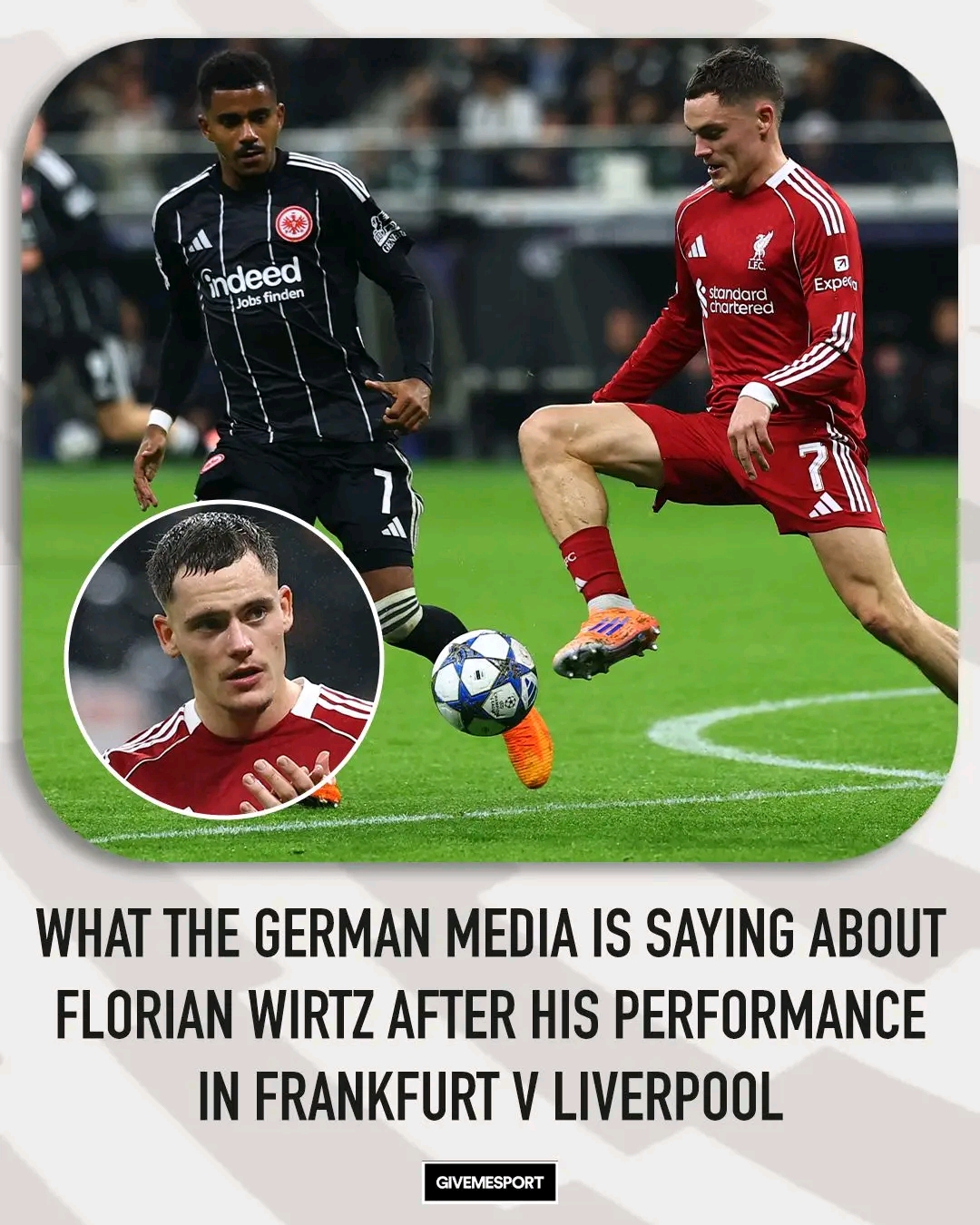Wirtz played his first game in Germany since his £116m from Leverkusen – and the German media have cast their verdict on him

It was a night of fire and redemption in Germany, a night when Liverpool rose from the ashes of doubt and humiliation, and when one young man, Florian Wirtz, finally reminded the world why Liverpool paid £116 million to bring him from Bayer Leverkusen. Under the bright lights of Frankfurt, the story was no longer about defeat or pressure, it was about revival, confidence, and the rebirth of a team that had been gasping for breath after four painful losses. The German media could not stay silent. Every newspaper, every website, every voice in the football world turned its attention to Wirtz, the boy who left his home country for England to chase greatness, and who returned to his land not as a visitor, but as a conqueror wearing the red of Liverpool.
When the night began, few believed that Liverpool could destroy Frankfurt the way they did. Arne Slot’s side had been haunted by the ghosts of failure, losing four consecutive games for the first time since 2014, back when Brendan Rodgers was in charge. Confidence had disappeared, anger had filled the dressing room, and criticism had filled the media. People were asking whether Slot had lost control, whether Liverpool’s heavy spending had gone to waste, and whether their identity was fading. But then came that unforgettable Champions League night, where everything changed. Five different players—Hugo Ekitike, Virgil van Dijk, Ibrahima Konate, Cody Gakpo, and Dominik Szoboszlai—each wrote their name on the scoresheet, but behind the scenes of those goals, one man pulled the strings, one man made everything flow again, and his name was Florian Wirtz.
For Wirtz, this was not just another game. It was personal. It was emotional. It was a return to Germany, the place that raised him, the country that watched him become a wonderkid at Bayer Leverkusen, and now, the country that questioned whether leaving for Liverpool was a mistake. Since his record-breaking move, Wirtz had been under immense pressure. The Premier League was faster, rougher, and more chaotic than the Bundesliga. He had struggled to adapt, often drifting through matches without impact. Fans began to whisper that maybe he wasn’t ready, maybe he wasn’t the player they thought he was. But football, like life, has its moments of redemption, and that night against Eintracht Frankfurt, everything changed.
The German press had come prepared with pens sharpened for criticism, but what they witnessed forced them to change their tune. Wirtz glided across the pitch like a dancer who knew every rhythm of the song. He drifted wide when Liverpool lost the ball, pressing with energy and determination, but when the Reds had possession, he became something else—a conductor in the middle of a chaotic orchestra, controlling tempo, dictating flow, and creating magic. The numbers said it all: two assists, four key chances created, a perfect 100 percent completion on long passes, and 89 percent overall pass accuracy. Those statistics did not just tell a story; they screamed redemption.
German Football News gave him an 8 out of 10 and named him Man of the Match. Their words carried a tone of pride mixed with relief. They wrote that sometimes familiarity helps restore confidence, and that Wirtz, back on German soil, finally rediscovered himself. The German fans in the stadium could feel it too. Every time Wirtz touched the ball, there was a ripple of expectation, a sense that something special could happen. And it did—again and again. His assist for Gakpo’s goal was pure vision, a no-look pass that cut Frankfurt’s defense like a knife. His delivery for Szoboszlai’s finish was perfection, the kind of pass only the most gifted players see before it happens.
BILD, one of Germany’s most powerful newspapers, didn’t hold back either. They wrote that his return to the German football stage had been “eagerly awaited” and that Wirtz “didn’t disappoint.” They described his second-half performance as the proof of why Liverpool had spent more than €100 million for his signature. The article read like a confession from the critics who had doubted him, an admission that perhaps they had been too quick to judge. “After a subdued first half,” BILD wrote, “the attacking star showed why Liverpool had paid over 100 million euros for him in the summer.” It wasn’t just a football review—it was a recognition of brilliance.
Then came Kicker, another respected German outlet, adding their voice to the growing chorus of praise. They admitted that Wirtz’s early months at Anfield had been “mixed,” that he was still adjusting to the speed and intensity of English football. But they highlighted how Wednesday night’s performance could be the turning point, the moment everything begins to click. “Wirtz, who had worked hard but was unlucky in the first half, set up the Reds’ fourth and fifth goals, boosting their confidence a bit.” Those words—boosting confidence—were about more than just Liverpool. They were about Wirtz himself, a 22-year-old star finally finding his rhythm again.
For Liverpool fans watching back home, there was a sense of joy that had been missing for weeks. They had seen their team crumble against rivals, seen Arne Slot’s tactics questioned, seen the players’ body language sink lower and lower. But on this night, something changed. The ball moved quicker. The passes found their targets. The pressing was fierce again. And it was all flowing through Wirtz. Every time he picked up the ball, the energy in the stadium shifted. He reminded Liverpool fans of what they had missed since the departure of creative forces like Philippe Coutinho—a midfielder who could dance past defenders, who could create something from nothing, who could make football look easy.
In the post-match analysis, pundits across Germany and England agreed that this was Wirtz’s best performance since joining Liverpool. Some even compared it to his best days at Leverkusen, when he used to dominate matches in the Bundesliga and terrorize defenses with his creativity. They said that if he could bring that version of himself to the Premier League, Liverpool would once again become one of the most feared teams in Europe. Because it wasn’t just about his skill; it was about his courage to take responsibility, to play with freedom, to demand the ball when others hid.
What made the story even more emotional was the context surrounding Liverpool. Before this game, the mood around the club had been toxic. Rumors of dressing room tension had started to leak. Mohamed Salah, who had been benched for two consecutive Champions League matches, was visibly frustrated. He posted cryptic messages on social media after the Frankfurt win, showing that not everything was peaceful. Arne Slot was facing questions about his authority, about whether he had the courage to drop big names and trust the new generation. But against Frankfurt, Slot’s decision to believe in Wirtz paid off. The young German didn’t just play well; he justified every penny of his massive transfer fee.
Liverpool’s victory meant more than three points. It was a psychological turning point. A message to the Premier League and the Champions League that they were not finished, not broken, not gone. The team that had been crushed by defeat after defeat now looked reborn. The passing was sharper, the finishing clinical, and the pressing relentless. Even players who had struggled, like Konate and Gakpo, looked reborn. It was as if Wirtz’s calm confidence had spread through the whole squad, unlocking their belief again.
For the German fans watching from home, there was pride. Many had felt betrayed when Wirtz left Leverkusen, believing he should have stayed longer. But now, seeing him shine against Frankfurt in Liverpool colors, they couldn’t help but smile. It was a reminder that Germany’s new generation of stars was still rising on the biggest stages. Commentators on German television praised him endlessly. They spoke about how rare it is to see a 22-year-old control a Champions League game with such elegance and maturity. One even said, “He didn’t just play football tonight—he commanded it.”
Arne Slot’s press conference afterward was calm but filled with quiet satisfaction. When asked about Wirtz, he simply said, “He played like a man who belongs here.” Those words carried meaning. It was Slot’s way of confirming what everyone had seen—that Wirtz had finally arrived. The Liverpool manager knew how much pressure his young star had been under. When a club spends over £100 million on a player, expectations become enormous. Every bad pass becomes a headline. Every missed shot becomes a story. But that night, Wirtz silenced all of it.
The next test would come quickly. Liverpool were heading to London to face Brentford, a team known for its intensity and energy. Arne Slot now faced a difficult decision—how to fit all his stars into one lineup. After Wirtz’s performance, leaving him out was unthinkable. But what about Salah? Would he start on the bench again? The situation was delicate. The cameras would be waiting to see the body language, to read the tension. But one thing was clear—Florian Wirtz had made himself undroppable.
The streets of Liverpool the next morning were filled with optimism again. Fans talked about Wirtz’s assists, about the swagger in his step, about how he looked like he had been playing for Liverpool for years. On social media, clips of his no-look passes and quick turns went viral. Supporters who had doubted him were now apologizing, admitting that they might have judged too soon. It was the kind of transformation football lives for—the moment when a struggling player becomes the hero overnight.
At Anfield, his teammates spoke highly of him. Virgil van Dijk said Wirtz had brought “calm and creativity” to the midfield. Szoboszlai said he was “a joy to play with.” Even Ekitike, who scored his first Liverpool goal, said, “Wirtz makes everything easier for us.” That is what great players do—they make others better. And that is what Wirtz did in Frankfurt. He didn’t just shine; he made the whole team shine.
The German media, who had criticized Liverpool’s form for weeks, now filled their front pages with headlines about Wirtz’s comeback. “The Prodigal Son Returns in Red,” one paper wrote. “Wirtz Silences the Doubters,” said another. For a country that takes pride in its football stars, it was a moment of national joy. Even Leverkusen fans, though still bitter about his departure, couldn’t deny the quality of his performance. They saw the same magic they used to see every weekend in the Bundesliga, only now it was lighting up the Champions League.
Football has a way of writing stories that feel almost cinematic. A player leaves his homeland for a new challenge, struggles, faces criticism, returns home under pressure, and then delivers a masterclass. That was the script of Florian Wirtz’s night in Frankfurt. It was more than just football—it was poetry on grass. It was the moment when talent met destiny, when confidence returned, when the boy from Pulheim became the man Liverpool needed.
Now the question is what comes next. Can Wirtz keep this form? Can he carry it into the Premier League, where the defenders are tougher and the pressure never stops? If he can, Liverpool may have found the key to unlocking a new era under Arne Slot. Because for all the tactical debates and transfer gossip, football still belongs to those who can create magic. And in Frankfurt, Florian Wirtz reminded the world that he is one of those rare players who can.
As the night ended and the stadium lights dimmed, the cameras caught Wirtz walking off the pitch with a quiet smile. No wild celebration, no arrogance—just satisfaction. He looked up at the stands filled with German fans, some cheering, some booing, but all watching him. It was his home, and for ninety minutes, he had ruled it again. The boy who left Germany for England had returned not as a dreamer, but as a conqueror in red. And that is how legends begin.















